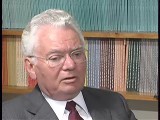You searched for: Concentration camps
<< Previous | Displaying results 1026-1050 of 1116 for "Concentration camps" | Next >>
-
Jakab Katz
ID CardJakab, a religious Jew, was the father of eight children. In the early 1900s he sailed to America, paying his way by shoveling coal on the ship. In New York he earned enough money to help two of his daughters immigrate. Returning to Buj, he eventually moved his family to Zalkod, a small town in northeastern Hungary. There, helped by his wife, Terez, and his son, Miklos, he ran a store and a farm. 1933-39: Jakab's daughter, Sadie, and her two children, Lillian and Arthur, are visiting from America. The…
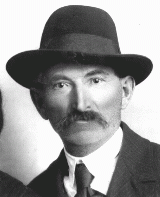
-
Alexandra Schicharva
ID CardAlexandra was the second-youngest of six children born to Russian Orthodox parents. Her family lived in a small village in the Orlovskaya region, some 250 miles south of Moscow [in the Soviet Union]. She attended public school, where she learned German. Alexandra's father was a plasterer and painter, and often worked away from home for months. Her mother worked at a collective farm in the village. 1933-39: In 1933 food was scarce. The government seized grain harvests for export; other crops were taken to…
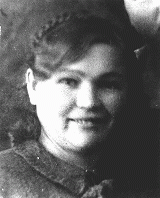
-
Bruno Klein
ID CardBruno was the youngest of six children born to Jewish parents in the city of Osijek in eastern Croatia when it was still part of the Austro-Hungarian Empire. He attended elementary school in Osijek and then completed his secondary schooling in Poega, a Croatian town where his parents had moved in 1923. In 1932 the Klein family moved to Zagreb, the capital of Croatia. 1933-39: While living with his parents in Zagreb, Bruno attended medical school until 1938, when he graduated. He specialized in internal…
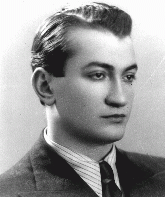
-
David Klebanov
ID CardBorn in the town of Volkovysk when it was part of Russia, David was the son of middle-class Jewish parents. When the family's life was disrupted by World War I and the Russian Revolution of 1917, they moved to Borisov and Kiev before finally settling in the Polish city of Bialystok. After completing secondary school in 1925, David studied medicine at Stefan Bathory University in Vilna. 1933-39: After medical school David served one year in the Polish army. Then he practiced obstetrics at a beautiful…
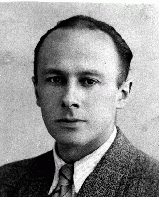
-
Onti Lazar
ID CardOnti, the youngest of five sons, was born to religious Jewish parents in northern Transylvania, a region of Romania that had belonged to Hungary until 1918. Onti's family usually called him Usher, which was the diminutive of his Yiddish name, Anschel. As a little boy, he liked collecting figurines. Though Onti grew up in a Hungarian-speaking home, he attended Romanian public schools. 1933-39: At age 13 Onti quit school to help make ends meet. He wanted to become a watchmaker, but he settled on working as…
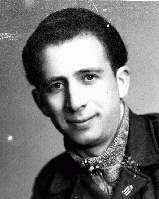
-
Frieda Greinegger
ID CardFrieda was the fourth of five children born to strict Catholic parents. She had one brother and three sisters. Frieda grew up on a large farm near the village of Michaelnbach in northern Austria. The farm had cattle, horses, pigs and poultry, and the children worked long hours helping their parents on the farm. At age 12, Frieda left school to work full time on the farm. 1933-39: Germany annexed Austria in March 1938. When war broke out in September 1939, Frieda's brother was drafted into the German army.…
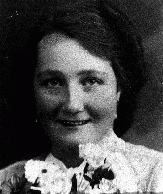
-
Ezra BenGershom
ID CardEzra was born to a Jewish family in the Bavarian city of Wurzburg. In the summer of 1929, his father, a third-generation rabbi, accepted a position as a district rabbi, guiding 12 congregations in Upper Silesia. In primary school, Ezra, who showed a keen interest in chemistry, was often harassed by his schoolmates for being Jewish. 1933-39: Because of his "Nordic" features, Ezra was able to frequent places where Jews couldn't go. In 1938, one year after he entered a Jewish secondary school in Berlin, the…
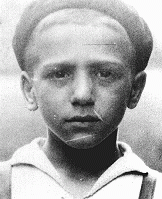
-
Josef Malnik
ID CardRaised in a Jewish family, Josef lived with his wife, Feiga, in Kovno, a cosmopolitan city that was picturesquely situated at the juncture of two rivers and was known as the "Little Paris." Josef was a barber, his wife was a beautician, and together they ran a shop in downtown Kovno. 1933-39: Every day Josef and Feiga walk to their shop which is not far from their house. It's hard work being a barber--Josef is on his feet most of the day, seven days a week including a couple of hours on Sunday. He has…
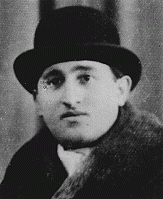
-
Edek Blonder
ID CardThe Blonder family lived in a two-room apartment in the back of a store. Edek was the third of eight children. His father eked out a meager living by tutoring students in Jewish subjects, and beginning in 1930 he worked distributing food vouchers to the poor. 1933-39: After graduating from secondary school, Edek was invited to play soccer professionally on the local Club Maccabi team, which was part of a Jewish soccer league. Club Maccabi arranged for him to attend trade school to learn cabinet making at…
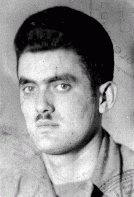
-
Jules Izrael Zajdenweber
ID CardJules grew up in a Jewish family in the industrial city of Radom, which had a large Jewish population and was known for its armaments industry. The Zajdenwebers spoke Polish and Yiddish at home. Jules' father was a textile salesman and his mother was a corset maker. Jules, whose nickname was Ulek, attended public schools in Radom and was a member of a Zionist youth organization. 1933-39: Jews weren't safe in certain neighborhoods. Some classmates at Jules's Polish state secondary school belonged to…
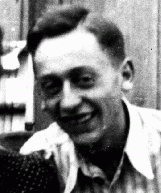
-
Charles (Karel) Bruml
ID CardCharles was born to a Jewish family in Prague, the capital of Czechoslovakia. His father owned several shoe factories there. Prague's Jewish minority enjoyed a great deal of cultural freedom because of the new democratic Republic. Though antisemitism still existed in Czechoslovakia, Prague was a relatively tolerant city. 1933-39: Charles' father's business thrived in Prague, and they lived well. Charles enjoyed painting as a child and decided to study at an art school in the city. On the morning of March…
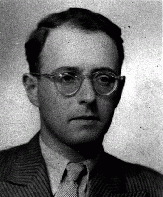
-
Frederick Fleszar
ID CardFrederick was the oldest of two sons born to Polish immigrants in Syracuse, New York. In 1922 Frederick's father, who was a musician, moved the family back to Poland where they settled in Poznan. There Frederick started public school and was accepted to the boys section of the prestigious Poznan Cathedral Choir. 1933-39: In 1933, at age 17, Frederick graduated from secondary school and enrolled in medical school at the university at Poznan. He sang with the choir for the last time the day he graduated…
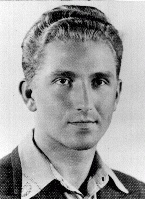
-
Settchen Oppenheimer
ID CardSettchen was one of three children born to a religious Jewish family in a small town in the German state of Hessen. Her father was a cantor and kosher butcher. Settchen completed grade school during the 1880s. Because of a digestive disease, Settchen was largely homebound. She never married, and lived with her younger sister and brother-in-law. 1933-39: Reichenbach was a quiet town. Its largely Protestant inhabitants were generally not antisemitic. After Hitler came to power in 1933, the Nazis staged…
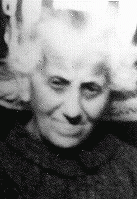
-
Jeno Brieger
ID CardJeno was born into a large, religious Jewish family in the village of Nagyhalasz in northeastern Hungary. The Briegers spoke Yiddish and Hungarian. After Jeno's mother died, his father remarried and the family moved to the town of Nyiregyhaza where his father owned and operated a hardware store. Nyiregyhaza had a Jewish population of 5,000. 1933-39: Jeno was the oldest son in a household of seven children. Nyiregyhaza was a rural town in which people still used horses and buggies. Jeno attended a…
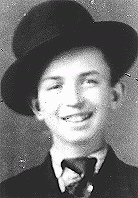
-
Hildegard (Hilda) Krakauerova Nitschkeova
ID CardHilda was the youngest of six children born to Jewish parents in a small Moravian town, where her father ran a dry-goods and clothing store. Her family spoke both Czech and German at home. Hilda was a tomboy when she was growing up, and competed on the Maccabi swim team. She attended a public secondary school in Hodinin, and wanted to pursue a career as a dental technician. 1933-39: In February 1933 Hilda moved to the Moravian capital of Brno where she attended dental school. On December 23, 1935, she…
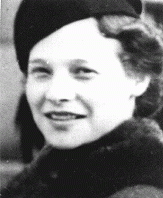
-
Miksa Deutsch
ID CardMiksa was the youngest of four children born to religious Jewish parents. The Deutches lived in the town of Bistrita in Transylvania, a region of Romania that belonged to Hungary until 1918. After 1910, the family lived in nearby Viseu de Sus. In 1922 Miksa moved to Budapest, Hungary, where he and his older brother, Pal, opened a business selling matches. In 1928 Miksa married Kornelia Mahrer. 1933-39: Miksa and Kornelia had three children, whom they raised with a religious education. Miksa and his…
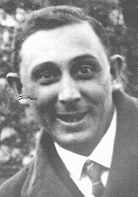
-
Jocheved Kuzda Kasher
ID CardJocheved, or Jadza as she was called at home, was born in the industrial city of Lodz, Poland's second-largest city. Before the war, one-third of Lodz's inhabitants were Jewish. The Kuzdas kept a traditional Jewish home and placed importance on their children's education. Jocheved had two older sisters, Sarah and Regina. 1933-39: Jocheved was 9 when the war broke out in September 1939. Instead of starting school, she stayed at home listening to the bombs exploding. Her father and sister tried to get to…
-
The "We Will Never Die" Pageant
Article"We Will Never Die" was a 1943 musical stage performance that raised awareness among Americans about the murder of European Jews. Learn more.
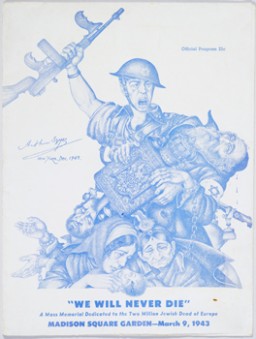
-
Opening of 1936 Summer Olympic Games
FilmIn 1933, Nazi Party leader Adolf Hitler became chancellor of Germany and quickly turned the nation's fragile democracy into a one-party dictatorship. Police rounded up thousands of political opponents, detaining them without trial in concentration camps. The Nazi regime also put into practice racial policies that aimed to "purify" and strengthen the Germanic "Aryan" population. A relentless campaign began to exclude Germany's one-half million Jews from all aspects of German life. For two weeks in August…
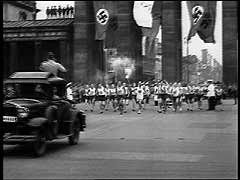
-
Fritzie Weiss Fritzshall describes deportation in cattle car to Auschwitz
Oral HistoryFritzie's father immigrated to the United States, but by the time he could bring his family over, war had begun and Fritzie's mother feared attacks on transatlantic shipping. Fritzie, her mother, and two brothers were eventually sent to Auschwitz. Her mother and brothers died. Fritzie survived by pretending to be older than her age and thus a stronger worker. On a death march from Auschwitz, Fritzie ran into a forest, where she was later liberated.
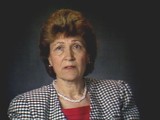
-
Isaac (Mike) Danon describes conditions in Yugoslavia and Italian occupation forces there
Oral HistoryIsaac lived with his parents and three sisters in Split, on the Dalmatian coast of Yugoslavia. When German and Axis forces invaded and partitioned Yugoslavia in 1941, Italian forces occupied Split along with other coastal areas of Yugoslavia. Italian occupation authorities in Yugoslavia generally prevented violent attacks on Jews. The Italian zone became a safe haven for those fleeing the Nazis or the Ustase (Croatian fascists). After Italy signed an armistice with the Allies in 1943, the area was occupied…
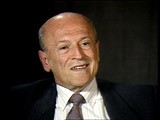
-
Rifka Muscovitz Glatz describes emotions surrounding the establishment of the state of Israel
Oral HistoryRifka was raised in a religious family in Debrecen. In the early 1940s, her family moved to Cluj (Kolozsvar) in Northern Transylvania, annexed to Hungary from Romania in 1940. In 1944, she and her family were forced to leave their house in Cluj. They were rounded up by Hungarian troops helping the Nazis and taken to a brick factory where they stayed for a month. In June 1944, Rifka was transported to the Bergen-Belsen concentration camp. Eight months later she was transported to Switzerland. She sailed to…
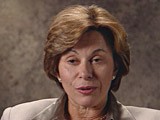
-
Francis Akos describes experiences in the immediate aftermath of the Holocaust
Oral HistoryAfter the Germans occupied Hungary in March 1944, Francis was deported to Neuengamme, a concentration camp located on the outskirts of Hamburg, Germany. Later, as Allied forces advanced, Francis and other prisoners were transported from Neuengamme. They were placed on a cargo ship which sailed into Luebeck Bay, where the prisoners were crowded onto the "Cap Arcona." The "Cap Arcona" and other ships were bombed in early May 1945. Francis was rescued and came ashore in the German town of Neustadt, where…
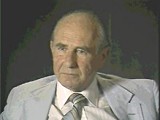
-
Thomas Buergenthal describes the impact of the Nuremberg trials on the development of international law
Oral HistoryJudge Thomas Buergenthal was one of the youngest survivors of the Auschwitz and Sachsenhausen concentration camps. He immigrated to the United States at the age of 17. Judge Buergenthal devoted his life to international and human rights law. He served as chairman of the United States Holocaust Memorial Museum’s Committee on Conscience; was named the Lobingier Professor of Comparative Law and Jurisprudence at the George Washington University Law School; and served for a decade as the American judge at…
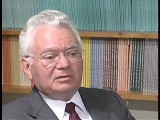
-
Thomas Buergenthal reflects on the value of truth commissions
Oral HistoryJudge Thomas Buergenthal was one of the youngest survivors of the Auschwitz and Sachsenhausen concentration camps. He immigrated to the United States at the age of 17. Judge Buergenthal devoted his life to international and human rights law. He served as chairman of the United States Holocaust Memorial Museum’s Committee on Conscience; was named the Lobingier Professor of Comparative Law and Jurisprudence at the George Washington University Law School; and served for a decade as the American judge at…
